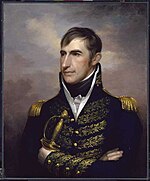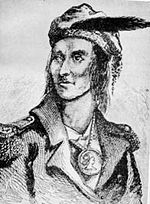Battle of the Thames
The Battle of the Thames, also known as the Battle of Moraviantown, was a decisive American victory in the War of 1812 which took place on October 5, 1813.
Background
In September, 1813 the American navy under Oliver Hazard Perry scored a decisive victory in the Battle of Lake Erie. British General Henry Procter, feared losing his supply lines and, against the advice of his ally Tecumseh, was retreating from Fort Malden. American General William Henry Harrison trailed Procter through Ontario. Tecumseh had pleaded with Procter to stop and face Harrison several times. Finally Procter was convinced to face Harrison at Moraviantown on the Thames River.
Forces
Harrison's force totaled at least 3,500 infantry and cavalry. Colonel Richard Mentor Johnson commanded the Kentucky cavalry; five brigades of Kentucky militia were led by Isaac Shelby, the sixty-three year-old governor of Kentucky and a hero of the American Revolutionary War. Many of the volunteers under Johnson were from the River Raisin area and enlisted with the slogan "Remember the Raisin". Harrison's army was eager for a fight.
Procter on the other hand had about 800 soldiers along with about 500 natives led by Tecumseh. The British soldiers were becoming increasingly demoralized and Tecumseh's warriors grew even more impatient with Procter for his unwillingness to stop and fight. Procter even feared a mutiny by the warriors.
The Battle

On October 4, Tecumseh skirmished the Americans near Chatham, Ontario to slow the American advance. The warriors were quickly overwhelmed and Procter's aide Lieutenant Colonel Augustus Warburton lost his supplies and ammunition to an American raiding party. On October 5 Procter formed the British regulars in line of battle at Moraviantown and planned to trap Harrison on the banks of the Thames, driving the Americans off the road with his cannons. Tecumseh's warriors took up positions in a swamp on the British right to catch the American's in the flank. General Harrison surveyed the battlefield and unconventionally ordered James Johnson (brother of Richard Johnson) to make a frontal attack against the British regulars. Despite the Indians' flanking fire James Johnson broke through; the British cannon having failed to fire. Immediately Procter and the British turned and fled the field, many of them surrendering. Tecumseh remained and kept up the fighting. Richard Johnson at the head of about 20 cavaliers charged into the Indian position to draw attention away from the main American force. Fifteen of the men were killed or wounded and Johnson himself was hit five times. Johnson's main force became bogged down in the mud of the swamp. Tecumseh was killed in this fighting; Colonel Johnson may have been the one who killed Tecumseh, though the evidence is far from certain. The main force finally made its way through the swamp and James Johnson's troops were freed from their attack on the British. With the American reinforcements converging and the death of Tecumseh spreading quickly the Indian resistance quickly dissolved. Mounted troops then moved on and burned Moraviantown.

Results
The Battle of the Thames was a decisive victory for the Americans that led to the re-establishment of American control over the Northwest frontier for the remainder of the war. However, Harrison failed to exploit this success and, after burning Moravian Town, promptly withdrew to Detroit. The front would remain quiet for the rest of the war.
Harrison's popularity grew and was eventually elected President of the United States. Richard Mentor Johnson eventually became Vice President based partly on the belief that he had killed Tecumseh.
Procter was later court-martialed for cowardice and removed from command. Historians have been somewhat kinder to Procter, noting that with the Americans in control of Lake Erie, the Detroit frontier was no longer tenable with the limited men and supplies available to Procter. The death of Tecumseh was a crushing blow to the Indian alliance he had created and it effectively dissolved following the battle.
Notes
- Template:Fnb Strength numbers and composition from John Sugden, Tecumseh: A Life (New York: Holt, 1997), pp. 368-72; casualty figures from John R. Elting Amateurs, To Arms! A Military History of the War of 1812 (Chapel Hill, NC: Algonquin, 1991;Da Capo reprint, 1995) p. 113.
References
- Carter-Edwards, Dennis. "The War of 1812 Along the Detroit Frontier: A Canadian Perspective," in The Michigan Historical Review, 13:2 (Fall 1987), pp. 25-50.
- Cleaves, Freeman. Old Tippecanoe: William Henry Harrison and His Time. New York: Scribner, 1939. ISBN 0945707010 (1990 reissue).
- Edmunds, R. David. "Forgotten Allies: The Loyal Shawnees and the War of 1812" in David Curtis Skaggs and Larry L. Nelson, eds., The Sixty Years' War for the Great Lakes, 1754-1814, pp. 337-51. East Lansing: Michigan State University Press, 2001. ISBN 0870135694.
- Elting, John R. Amateurs, To Arms! A Military History of the War of 1812. Chapel Hill, NC: Algonquin, 1991. ISBN 0945575084 (hardcover); ISBN 0306806533 (1995 Da Capo Press paperback).
- Sugden, John. Tecumseh's Last Stand. Norman, Oklahoma: University of Oklahoma Press, 1985. ISBN 0806119446.
- ———. Tecumseh: A Life. New York: Holt, 1997. ISBN 0805041389 (hardcover); ISBN 0805061215 (1999 paperback).
